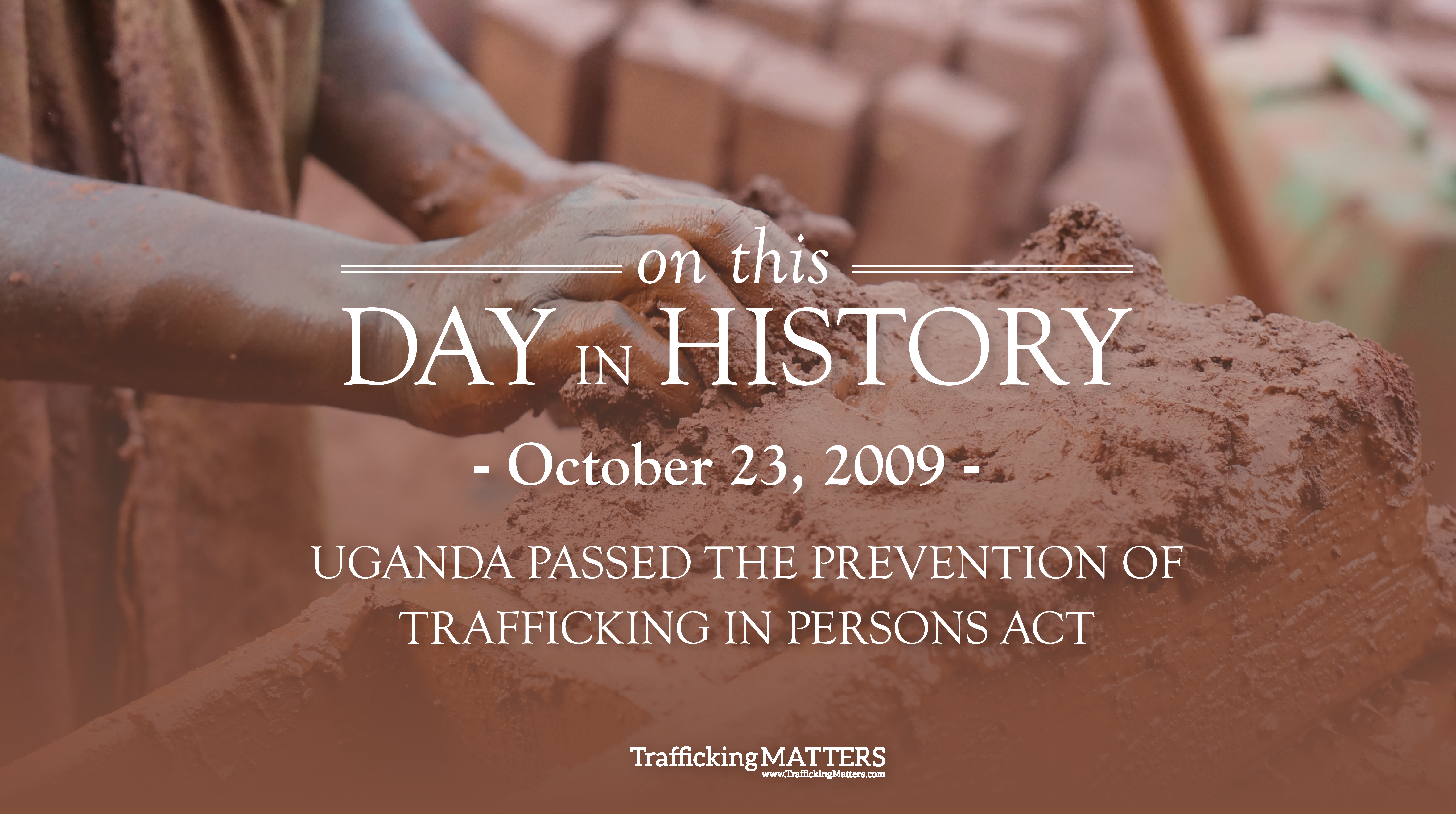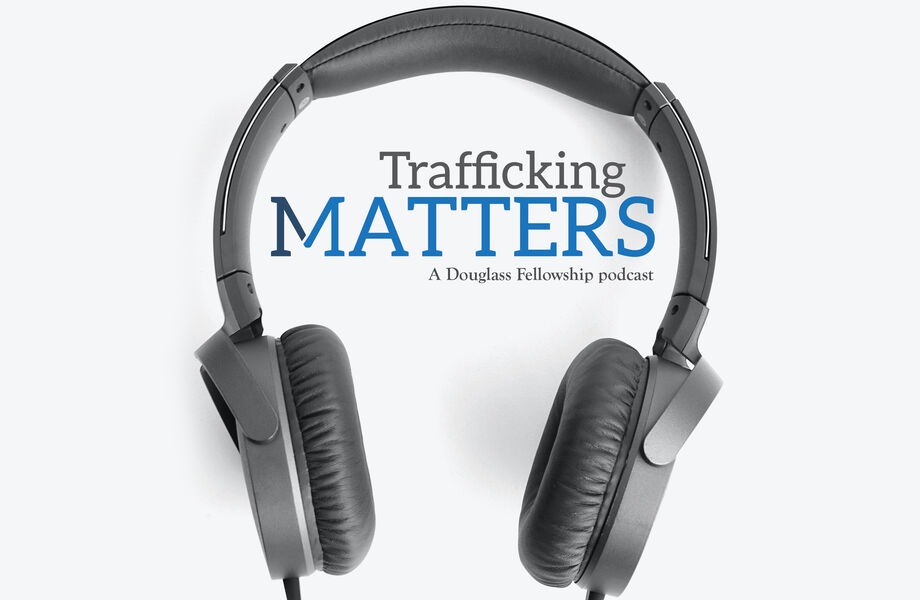By: TAYLOR KING
Ten years ago today – October 23, 2009 – Uganda authorized their Prevention of Trafficking in Persons Act (PTIP). This act prohibited all forms of human trafficking and prescribed punishments up to life in prison. Passage of this act was nearly 10 years in the making after the international community began acknowledging and passing protocols regarding human trafficking.
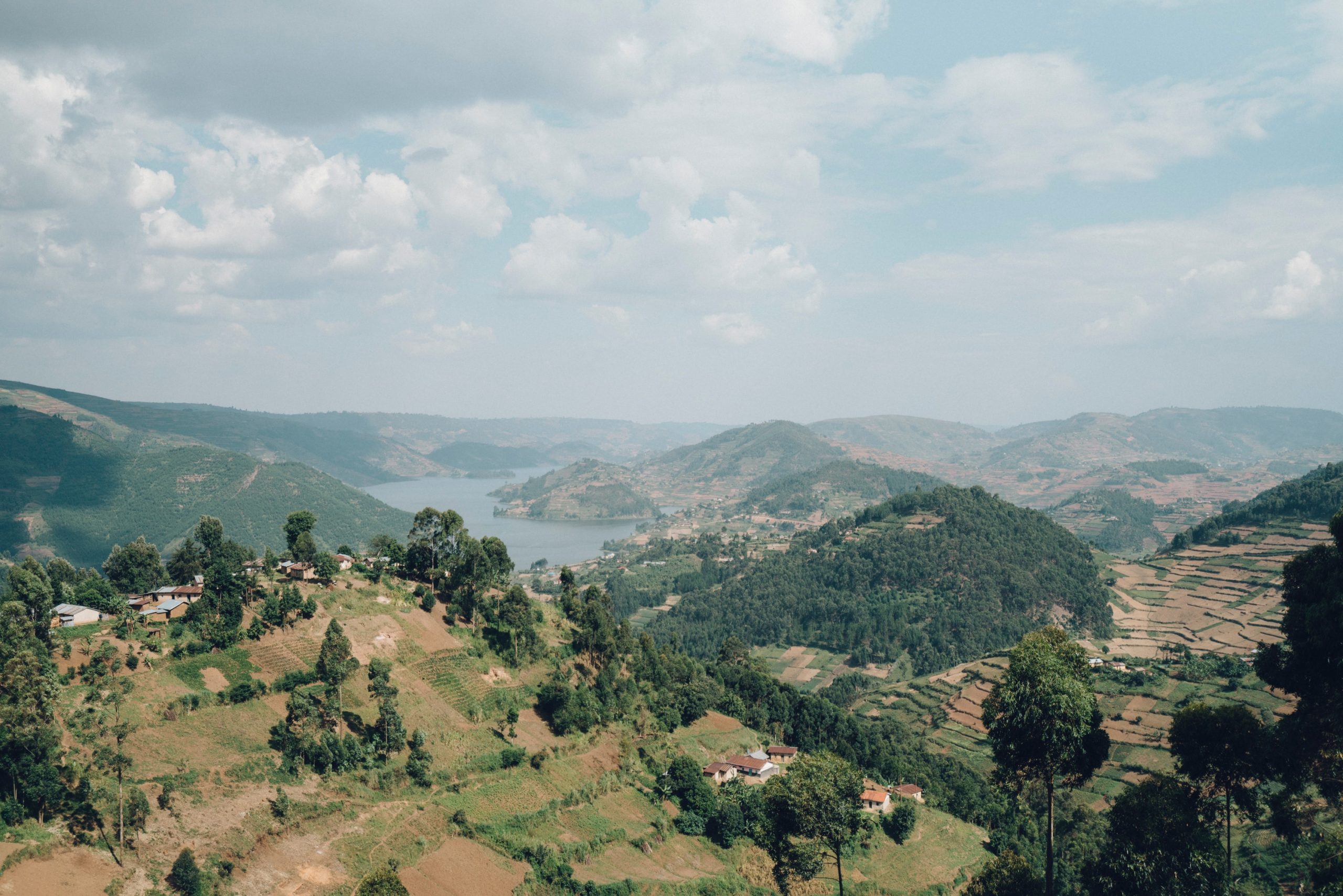
Uganda, with an estimated population of 42 million people, is located in East-Central Africa bordering Kenya, Rwanda, South Sudan, Tanzania, and the Democratic Republic of Congo. This former British protectorate gained its independence from the British Crown in 1962 but experienced significant political unrest in the following two decades.1 Then, in 1986, after years of war and political hostility, Yoweri Museveni assumed the presidency. His party, the National Resistance Movement, established the Ugandan Constitutional Commission to draft a democratic, permanent national constitution. In September 1995 — nine years later — the Constituent Assembly adopted the constitution, which continues to be the country’s governing document.
The Constitution begins with a preamble, which states its “principles of unity, peace, quality, democracy, social justice, and progress.” It also guarantees certain fundamental rights for Ugandan citizens:
“(i) The State shall guarantee and respect institutions which are charged by the State with responsibility for protecting and promoting human rights by providing them with adequate resources to function effectively.
(ii) The State shall guarantee and respect the independence of nongovernmental organisations which protect and promote human rights.”2
Although the country initially lacked the enforcement of these rights, the Constitution’s protection did provide a new foundation for human rights standards.3
Shortly after gaining independence in 1962, Uganda affirmed its commitment to human rights by joining the United Nations (UN), an intergovernmental organization responsible for maintaining international peace and security and promoting human rights. At the time, Uganda was one of 113 other member nations who made up the UN system.4
At the turn of the 21st Century, the introduction of the internet and increase in global trade and movement prompted the UN to make transnational organized crime a priority. In December 2000, the then 189-member organization met in Palermo, Italy, for the Palermo Convention. There, they discussed a particular subset of transnational crime — the trafficking of human beings.
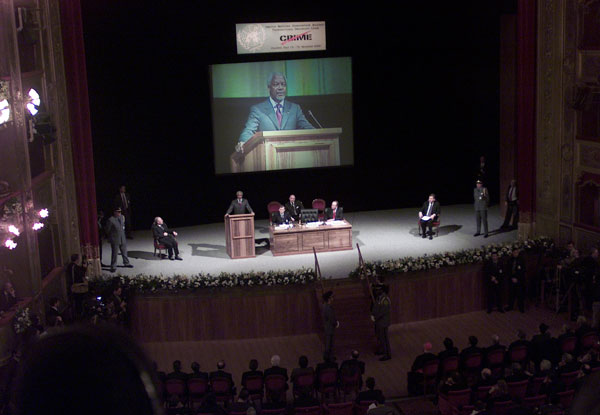
Palermo Convention, 12 December, 2000. United Nations Archives.
During the convention, the UN General Assembly voted to create the Palermo Protocols — among them the Protocol to Prevent, Suppress and Punish Trafficking in Persons, Especially Women and Children. The purpose of this protocol was three-fold5:
- To craft the first legally binding instrument with an agreed-upon definition of trafficking in persons
- To facilitate convergence in approaches to investigate and punish trafficking in persons
- To protect and support victims of trafficking in persons
In response to the protocols’ passage, many nations passed their own legislation against human trafficking.6
Almost 10 years later, on October 23, 2009, Uganda joined those nations with their own passage of the Prevention of Trafficking in Persons Act (PTIP). This act accomplished three main objectives:
- Defined the legal definition of human trafficking
- Determined the range of punishments for each applicable offense
- Established victim protection provisions.
PTIP defined human trafficking as anyone who recruits, transports, transfers, harbors, or receives another human being by means of threat, use of fraud, or other forms of coercion (a full list is available in the statute) for the purpose of exploitation. It prohibited and prescribed punishments of up to life in prison for trafficking an adult and up to death for trafficking a child. Additionally, it provided protection for trafficking victims and called for the Ministry of Internal Affairs to establish an office to coordinate, monitor, and oversee implementation of the act.7
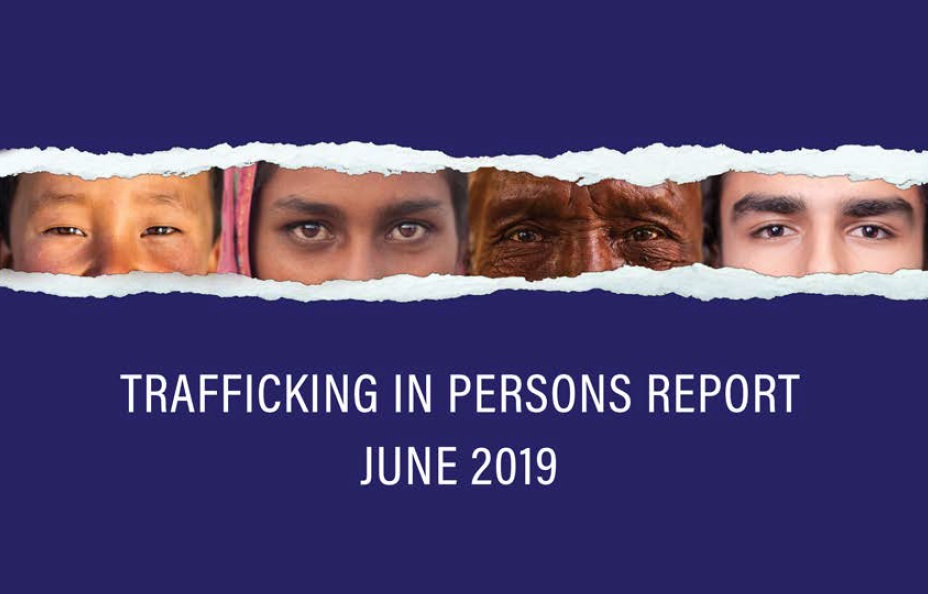
2019 Trafficking In Persons Report. United States Department of State.
While passing the act was an important step for Uganda, there was still a great amount of work left to be done. According to the U.S. Department of State’s 2019 Trafficking in Persons Report, Uganda has been classified as a Tier 2 country since 2009, meaning that its government “[has] not fully meet the TVPA’s minimum standards, but [is] making significant efforts to meet those standards.”8
Over time, the country has continued to make progress in their efforts to hinder traffickers and protect victims. Since 2015, the Ugandan government has reported the following to the U.S. Department of State:
- 946 investigations of potential cases of human trafficking
- 171 human trafficking prosecutions
- 53 convictions under the 2009 PTIP statute
Although every trafficker convicted signals a victory for anti-trafficking efforts, there are still many more victims in need of justice in Uganda. However, actual statistics on the prevalence of human trafficking are difficult to acquire because the crime is a covert activity.
In 2018, the Ugandan government designated specific law enforcement officials to be trained on how to properly identify and investigate trafficking cases. As a result, these officials have investigated more potential traffickers than the years prior and increased their prosecution of suspected traffickers.9 Additionally, the government established a trafficking-specific desk in the Office of the Director of Public Prosecution. And, in 2019, the Minister of Justice approved and published the implementing regulations for the PTIP act.
While work to bring traffickers to justice remains, it is important to recognize the strides Uganda has made to ensure the rights of all individuals are protected. On this day in history, we celebrate the commitment Uganda made 10 years ago to fight trafficking and set victims free.
- 1 Kaufman, Michael T. “Idi Amin, Murderous and Erratic Ruler of Uganda in the 70’s, Dies in Exile.” The New York Times, The New York Times, 17 Aug. 2003, https://www.nytimes.com/2003/08/17/world/idi-amin-murderous-and-erratic-ruler-of-uganda-in-the-70-s-dies-in-exile.html.
- 2 Constitution of the Republic of Uganda [Uganda], 22 September 1995. Accessed 22 October 2019, https://www.refworld.org/docid/3ae6b5ba0.html.
- 3 Country Report: Uganda. American Bar Association Rule of Law Initiative, 2017, Country Report: Uganda. https://www.verite.org/wp-content/uploads/2017/11/ABA-ROLI-Country-Report-Uganda-Aug-2017.pdf
- 4 “Growth in United Nations Membership, 1945-Present.” United Nations, United Nations, https://www.un.org/en/sections/member-states/growth-united-nations-membership-1945-present/index.html.
- 5 Antonio.devivo. “United Nations Office on Drugs and Crime.” United Nations Convention against Transnational Organized Crime, https://www.unodc.org/unodc/en/organized-crime/intro/UNTOC.html.
- 6 “UN, United Nations, UN Treaties, Treaties.” United Nations. United Nations, n.d. https://treaties.un.org/Pages/ViewDetails.aspx?src=TREATY&mtdsg_no=XVIII-12-a&chapter=18&lang=en.
- 7 “Uganda Trafficking in Persons Law Overview.” Uganda Trafficking in Persons Law Overview. Fairfax, VA: The Human Trafficking Institute, 2017. https://www.traffickingmatters.com/wp-content/uploads/legal-resources/uganda/Uganda-TIP-Report-2017-18.pdf
- 8 “Trafficking in Persons Report.” Trafficking in Persons Report. 19th ed., n.d. https://www.state.gov/wp-content/uploads/2019/06/2019-Trafficking-in-Persons-Report.pdf
- 9 Id.

